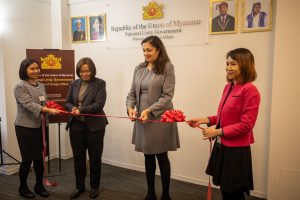Myanmar’s opposition National Unity Government (NUG) this week officially opened a liaison office in Washington, D.C., in order to initiate formal engagements with the U.S. government and press its claim for recognition as Myanmar’s legitimate government.
The opening of the office on Monday was made possible resulting from the passage of the Burma Act, as part of last year’s National Defense Authorization Act (NDAA). The Burma Act broadened the U.S. government’s authority to impose sanctions against the military government that seized power in February 2021 and extend a range of non-military aid to the various groups resisting the junta.
“The NUG’s office was able to be opened after the U.S. government enacted the Burma Act, which includes promises to encourage and support Myanmar’s democracy,” the NUG’s Foreign Minister Zin Mar Aung said during the opening of the embassy, adding the office would play an important role in the NUG’s struggle against the junta.
The former political prisoner and parliamentarian for Aung San Suu Kyi’s National League for Democracy said the “presence of U.S. government officials at the office opening … signaled the state of official engagement” between the U.S. government and the NUG.
Among those attending, Radio Free Asia (RFA) reported, was Uzra Zeya, the U.S. undersecretary of state for civilian security, democracy, and human rights, who after helping cut the ribbon on the office’s opening, reiterated the U.S. government’s commitment to the restoration of democracy in Myanmar.
“The U.S. government continues to encourage and support Myanmar’s return to the path of inclusive democracy as contained in the Burma Act,” Zeya said, according to RFA. “The deputy foreign minister also said that it is important for the United States and the countries in the region not to accept the fake election that will be held by the military junta.”
Here, Zeya was referring to the junta’s plans to hold a sham electoral process in order to stage a “transition” to a more veiled form of military rule. The election, initially scheduled for August, now appears in some doubt given the generalized state of conflict in the country, which recently prompted junta leader Senior Gen. Min Aung Hlaing to extend the state of emergency for a further six months.
The following day, Zin Mar Aung also met with Deputy Secretary of State Wendy Sherman, who said she “welcomed the NUG’s establishment of a liaison office in Washington and underscored the United States’ commitment to deepening engagement with the full range of pro-democracy stakeholders and diverse ethnic groups in Burma.”
The NUG was formed in April 2021, two months after the military’s seizure of power and its brutal repression of the peaceful protests that followed it, with the aim of unifying and coordinating the resistance to the military and gaining international recognition as Myanmar’s rightful government.
However, despite most Western nations roundly condemning the coup, few have extended the NUG the recognition that it requires. The main reason is that it would most likely force them to close their embassies in Yangon, cutting them off from any diplomatic representation within the core of the country. It might also court tensions with neighboring countries, such as China and Thailand, that have taken a relatively accommodating position toward the coup government, and commit them to a level of support to the NUG that they are unable or unwilling to take.
Many in Myanmar have hailed the passage of the Burma Act as a clear signal of Washington’s support to the country’s pro-democracy movement. As Ye Myo Hein, a visiting scholar U.S. Institute of Peace, wrote in these pages on the second anniversary of the coup at the start of this month, the incorporation of the Burma Act in the 2023 NDAA “has raised strong public expectations that substantial U.S. support will be forthcoming to the elements of the resistance named in the act.” He added, however, that “a failure or substantial delay in delivery of this assistance could also erode people’s confidence in the U.S. government’s declared support for the pro-democracy movement.”
As usual, Western governments including the U.S. have to tread a careful line in expressing their opposition to the coup, without raising hopes that they can’t possibly fulfill.

































